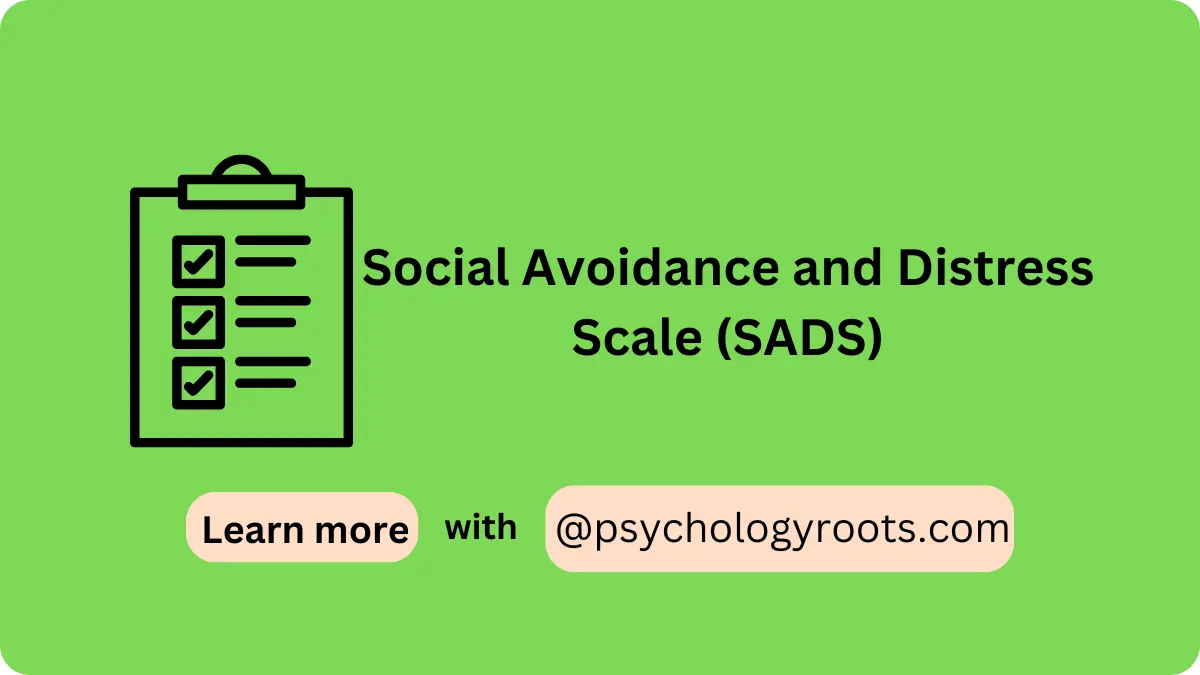Table of Contents
Social Avoidance and Distress Scale (SADS)
Here in this post, we are sharing the “Social Avoidance and Distress Scale (SADS)”. You can read psychometric and Author information. We have thousands of Scales and questionnaires in our collection (See Scales and Questionnaires). You can demand us any scale and questionnaires related to psychology through our community, and we will provide you with a short time. Keep visiting Psychology Roots.
About Social Avoidance and Distress Scale (SADS)
Scale Name
Social Avoidance and Distress Scale (SADS)
Author Details
Watson, D., and Friend, R.
Translation Availability
English

Background/Description
The Social Avoidance and Distress Scale (SADS) is a widely used self-report instrument designed to measure social-evaluative anxiety. Developed by Watson and Friend in 1969, it assesses two primary aspects of social anxiety:
- Social Avoidance: Behaviors associated with avoiding social interactions or situations.
- Distress: Emotional discomfort or fear experienced in social settings.
The SADS is particularly valuable for identifying individuals with significant levels of social anxiety, making it useful in both clinical and research contexts. It is frequently employed in studies on social phobia, generalized anxiety, and the effects of social interactions on mental health.
The questionnaire comprises 28 true/false items, with higher scores indicating greater levels of social anxiety and avoidance.
Administration, Scoring and Interpretation
- Introduction: Brief participants on the purpose of the assessment and ensure confidentiality of their responses.
- Target Audience: Adolescents and adults experiencing social anxiety symptoms.
- Format: Participants respond to 28 statements with “True” or “False,” reflecting their experiences in social situations.
- Time Required: Approximately 5–10 minutes.
- Scoring:
Reliability and Validity
The Social Avoidance and Distress Scale (SADS) demonstrates strong psychometric properties:
- Internal consistency: Cronbach’s alpha is generally above 0.80, reflecting high reliability.
- Test-retest reliability: Stable over time, supporting its use in longitudinal studies.
- Construct Validity: Correlates significantly with other measures of social anxiety and related constructs, such as shyness and interpersonal discomfort.
- Predictive Validity: Effective in identifying individuals with clinical levels of social anxiety.
Available Versions
28-Items
Reference
Watson, D., & Friend, R. (1969). Measurement of social-evaluative anxiety. Journal of Consulting and Clinical Psychology, 33(4), 448–457.
Important Link
Scale File:
Frequently Asked Questions
What is the primary purpose of the SADS?
To measure social anxiety through self-reported avoidance behaviors and distress in social situations.
Who can use the SADS?
It is suitable for adolescents and adults in clinical, research, or community settings.
How long does it take to complete?
Approximately 5–10 minutes.
Is the SADS useful for diagnosing social phobia?
While not a diagnostic tool, it is effective for identifying individuals who may require further evaluation for social anxiety disorders.
Can the SADS be adapted for different cultures?
Yes, but cultural adaptations must be validated to maintain reliability and validity.
Disclaimer
Please note that Psychology Roots does not have the right to grant permission for the use of any psychological scales or assessments listed on its website. To use any scale or assessment, you must obtain permission directly from the author or translator of the tool. Psychology Roots provides information about various tools and their administration procedures, but it is your responsibility to obtain proper permissions before using any scale or assessment. If you need further information about an author’s contact details, please submit a query to the Psychology Roots team.
Help Us Improve This Article
Have you discovered an inaccuracy? We put out great effort to give accurate and scientifically trustworthy information to our readers. Please notify us if you discover any typographical or grammatical errors.
Make a comment. We acknowledge and appreciate your efforts.
Share With Us
If you have any scale or any material related to psychology kindly share it with us at psychologyroots@gmail.com. We help others on behalf of you.